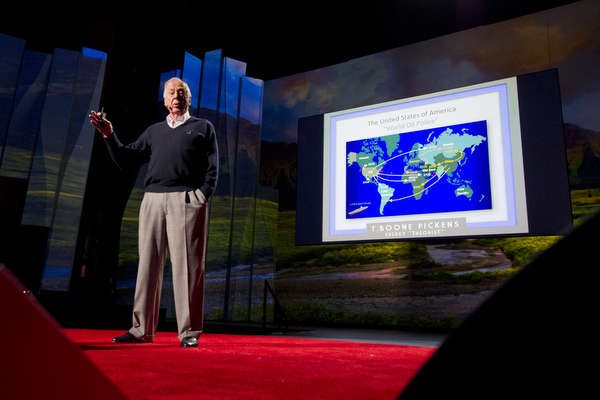Photo: James Duncan Davidson
“We’ve run into a giant fracking problem,” says TED curator Chris Anderson by way of introducing the next speaker, energy tycoon T. Boone Pickens, who comes to the stage to talk about methods to solve the energy crisis facing the United States. Or as he puts it, his “alternative to alternative energy” and what he sees as the urgent need for the United States to get off its addiction to OPEC oil. “It’s pretty clear to me we would prefer to have [energy that’s] cleaner, cheaper, domestic and ours,” he says. “And we have that: natural gas.”
To Pickens, the United States needs to escape its OPEC dependence as quickly as humanly possible. The world uses 89 million barrels of oil every day at an annual cost of $3 trillion, $1 trillion of which goes to OPEC. “It’s the greatest transfer of wealth from one group to another in the history of mankind–and it continues,” he says indignantly, before asking a fairly simple question: why does the United States own 11 aircraft carriers, five of which are based almost permanently in the Middle East? “They’re there to keep the shipping lanes open and make oil available,” he answers.
There’s a proportional problem, too. The U.S. uses 20 million barrels of oil a day. That’s 25% of all the oil used in the world every day–for just 4% of the population. “Somehow that doesn’t seem right. That’s not sustainable. So where do we go from here?”
But while some call for us to change our behaviors or try to temper our energy usage, Pickens says simply that we’re set to double demand in the years from 1990 to 2040. To him, that means we have to figure out a way to sate that demand some time soon. And while China has a plan; the United States has no such thing. “In the history of America, we’ve never had an energy plan. We don’t even realize the resources we have available to us,” he says, before adding some disparaging thoughts about the government’s ability to understand what it’s dealing with. “I had people in Washington last week tell me the Saudis can produce oil for $5 a barrel,” he says. “That has nothing to do with it. There is no free market for oil. What they have to pay for it is what we’ll pay for it.” (An oilman’s aside, he can’t resist challenging Saudi claims of their holding 250 billion barrels of oil: “I don’t believe it. It’s probably 175 billion barrels. They say they’re right, but whatever.”)
So where are we headed? In Pickens’ eyes, in one direction, towards natural gas, which he describes as a “bridge fuel” to a cleaner future. “It will do everything we want it to do,” says Pickens. “It’s 25% cleaner than oil; it’s ours, and we have an abundance of it.” And it solves many of our energy needs”–including transportation, which accounts for 70% of current oil usage. That’s why he’s particularly targeting the conversion of heavy duty, 18-wheeler trucks. “Take them to natural gas, reduce carbon by 30% and cut our imports by 3 million barrels.”
It’s a first step towards energy autonomy, Pickens’ only real concern. As for where natural gas is bridging us to? Pickens doesn’t say. “I don’t have to worry about where the bridge goes at my age. That’s your concern.”
T. BOONE PICKENS IN CONVERSATION
Chris Anderson has questions. In a highly entertaining exchange on stage, the oilman never misses a beat. An edited version of the conversation follows:
Chris Anderson: Natural gas is a fossil fuel. You believe in climate change. Why doesn’t that bother you?
T. Boone Pickens: Well, you have to use something. [laughter]
CA: So the argument that natural gas is a bridge fuel makes sense. Everyone will be happy to see a shift from oil and coal. But if that’s as far as it goes, are we screwed?
TBP: Like I said, I don’t have to worry.
CA: Do you support a carbon tax?
TBP: I don’t believe in a price on carbon, because the government is going to control it and they’re going to fail.
CA: We have a question from the audience: What about methane release from fracking?
TBP: What’s fracking? [a pause, a look from Chris] I’m kidding. I witnessed my first frack job in 1953. I hear the president say the DOE invented it 30 years ago and I don’t know what he’s talking about. I fracked over 3,000 wells in my life and never had a problem with an aquifer. I don’t understand why the media is focused on eastern Pennsylvania.
CA: If someone here comes to you with a plan that really has potential, are you willing to invest even if it won’t maximize profits, but will maximize the future?
TBP: I lost $150 million on wind so sure. I’m all about solving energy for America.

Comments (22)
Pingback: Uniting a Fractured Republic | Socialist Agenda Webzine
Pingback: Oil and Gas News | Lousiana Oil and Gas Association
Pingback: Will the U.S. export fracking to the rest of the world? | 24X7 USA Times
Pingback: Will the US export fracking to the rest of the world? | RefineryNews.com
Pingback: Will the U.S. export fracking to the rest of the world?
Pingback: TED2012 remixed: It’s Time for TED | 2012: What's the 'real' truth?
Pingback: Monday Mantra—Enough With the Aiming! « stacystyle's blog
Pingback: TED2012 remixed: It’s Time for TED « Curio.us
Pingback: “It’s Time for TED”: TED2012 remixed by John Boswell | Krantenkoppen Tech
Pingback: Pickens at TED: Natural Gas a ‘Bridge’ to Energy Autonomy | RefineryNews.com
Pingback: Nathan Myhrvold demonstrates the T. Boone is off his rocker « A Man With A Ph.D.
Pingback: Best TED talk so far in 2012 « A Man With A Ph.D.